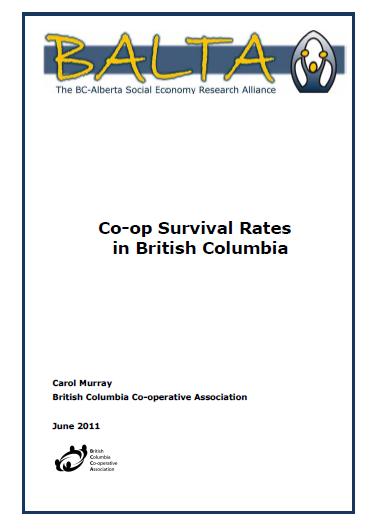 To date, no study has been conducted on the survival rates and success factors of co-operatives in BC. Data from a 2008 Quebec study, which showed a 64% survival rate of co-operatives in that province, have comprised the comparison of co-op and conventional business success, but questions remain as to whether Quebec data can be applied to other regions of the country. The lack of regional BC data has hampered the efforts of the B.C. Co-operative Association, along with consultants and stakeholders, to determine the necessary supports to co-ops in the province. The findings from the study will provide valuable information on the efficacy of co-op development practice, the means by which such practice might be improved, and the environmental factors that either contribute to, or detract from, the development and survival of co-ops.
To date, no study has been conducted on the survival rates and success factors of co-operatives in BC. Data from a 2008 Quebec study, which showed a 64% survival rate of co-operatives in that province, have comprised the comparison of co-op and conventional business success, but questions remain as to whether Quebec data can be applied to other regions of the country. The lack of regional BC data has hampered the efforts of the B.C. Co-operative Association, along with consultants and stakeholders, to determine the necessary supports to co-ops in the province. The findings from the study will provide valuable information on the efficacy of co-op development practice, the means by which such practice might be improved, and the environmental factors that either contribute to, or detract from, the development and survival of co-ops.
This current study assessed the survival rates and success factors of operating and dissolved cooperatives in BC between 2000 and 2010. Both quantitative and qualitative data were collected and analyzed; an online survey was completed by 41 operating co-ops out of a total 150 co-ops incorporated between those dates that are still in operation (27%) and 15 dissolved co-ops out of a
total of 100 (15%). Of these, 21 operating and 5 dissolved co-ops participated in a follow-up telephone survey.
The research aims were to establish the:
- number and variety of co-ops incorporated in BC over the last ten years;
- conditions that gave rise to the incorporation of these co-ops;
- survival rate of incorporated co-ops;
- reasons for a co-op’s discontinuance;
- ways in which a co-op’s early development and incorporation might be assisted;
- ways by which a co-op’s demise might have been averted.
In this research, we assumed that success referred firstly to viability – whether a co-op was in a position to pursue its objectives. Success can then be further defined by the level of member satisfaction with the outcomes of the co-operative, as well as with the internal processes, such as member and board relations and inter-organizational relationships, developed by the co-op along the way. Success factors, then, would be those practices that assisted or supported these objectives and outcomes.





